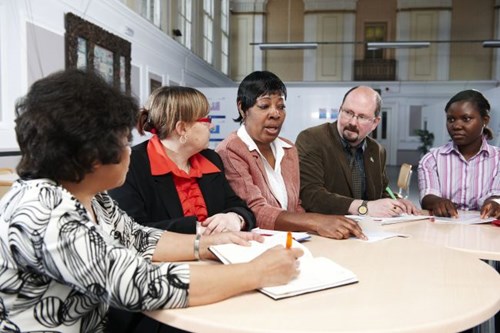Embedding Equality Impact Assessments (EIA) into the development of services and policies is designed to ensure everyone has equal access to the healthcare they need.
We developed a bespoke training programme and toolkit to help CCGs gain the skills and the confidence to carry out EIAs that not only meet their duties under the Equality Act (2010), but help them deliver effective and appropriate services to their communities.

The challenge
Ensuring people have equal access to health services is a challenge, particularly when the local population is very diverse. It is important to understand where gaps exist in local healthcare provision and where people could be disadvantaged from accessing services by the decisions commissioners make.
We are working with Clinical Commissioning Groups (CCGs) in Warwickshire, Coventry and Worcestershire to help them understand these challenges and use the EIA process to positively address potential inequalities, support decision-making and deliver better value for money.
Our approach
Using our knowledge and insight into the health needs of the local population, we have developed a package of training and tools to help CCGs gain a better understanding of their local communities so that they can plan, commission and deliver effective services.
We developed a tailored training programme specifically designed to meet the needs of commissioners, recognising the pressures on time and the need to deliver learning around the most important aspects of EIAs.
Delivered at multiple sites for added convenience, the sessions were kept to a maximum of 2 ½ hours, and equipped attendees with the skills and the confidence to carry out effective EIAs.
The training is complemented by our supportive toolkit which gives clients access to a wide range of materials. This includes a step-by-step guide to completing an EIA, a simple EIA template, completed EIA examples, a useful summary of the Human Rights Act and a diversity calendar to highlight specific religious or cultural observances that can be factored into the planning of events or meetings.
The toolkit also includes an online index of deprivation which allows our clients in Coventry, Warwickshire and Worcestershire to search by area or postcode and see how the local population might be affected by a service change, for example by the closure of a walk-in centre.
To ensure CCGs are kept up to date, we issue a monthly Equality and Diversity newsletter which provides an overview of relevant national news stories, policy changes and journal articles.
The outcomes
The combination of training and ongoing support tools means our clients are building capacity in their own organisations to ensure equality is considered at the outset.
This has resulted in a much better understanding of equalities and a number of unexpected considerations have been highlighted during the planning of new services. For example, a community optometry project in South Worcestershire was tailored to take into account the specific needs of the gay community, where it has been recognised that a more common use of Amyl Nitrate (poppers) can have a detrimental impact on eyesight.
We are continuing to work with our partners to raise the profile of equality, and help them to find locally-tailored solutions that achieve maximum benefit and deliver value for money.
"The level of detail and knowledge imparted during the training was impressive. We always need to be assured that we’ve considered the needs of individuals when developing policies and strategies and to know that the team stays abreast of the latest guidance."
Chris Emerson, Head of Commissioning, NHS Wyre Forest Clinical Commissioning Group
More on this service
